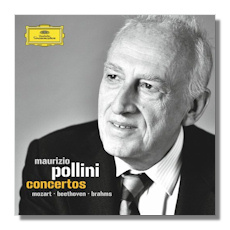
The Internet's Premier Classical Music Source
Related Links
-
Beethoven Reviews
Brahms Reviews
Mozart Reviews - Latest Reviews
- More Reviews
-
By Composer
-
Collections
DVD & Blu-ray
Books
Concert Reviews
Articles/Interviews
Software
Audio
Search Amazon
Recommended Links
Site News
 CD Review
CD Review
Pollini

Concertos
- Ludwig van Beethoven:
- Piano Concerto #1 in C Major, Op. 15 1
- Piano Concerto #2 in B Flat Major, Op. 19 1
- Piano Concerto #3 in C minor, Op. 37 1
- Piano Concerto #4 in G Major, Op. 58 1
- Piano Concerto #5 in E Flat Major "'Emperor", Op. 73 3
- Choral Fantasia in C minor, Op. 80 2,5
- Johannes Brahms:
- Piano Concerto #1 in D minor, Op. 15 3
- Piano Concerto #2 in B Flat Major, Op. 83 2
- Wolfgang Mozart:
- Piano Concerto #12 in A Major, K414 4
- Piano Concerto #17 in G Major, K453 4
- Piano Concerto #19 in F major, K459 3
- Piano Concerto #21 in C Major "Elvira Madigan", K467 4
- Piano Concerto #23 in A Major, K488 3
- Piano Concerto #24 in C minor, K491 4
Maurizio Pollini, piano
5 Vienna State Opera Choir
1 Berlin Philharmonic Orchestra/Claudio Abbado
2 Vienna Philharmonic Orchestra/Claudio Abbado
3 Vienna Philharmonic Orchestra/Karl Böhm
4 Vienna Philharmonic Orchestra/Maurizio Pollini
Deutsche Grammophon 4790913 8CDs
Pollini's Deutsche Grammophon output has been all over the label's numerous lines and reissue programs. Hence the most valuable part of this "original jacket" package might just be the two final Mozart discs, which took forever to reach the domestic market and are fine testaments to the pianist's Mozart credentials. The rest of the set is devoted to Beethoven and Brahms, and with the exception of the Abbado/Berlin cycle, show the artist at his early best.
This "Emperor" was last seen in DG's generally well-chosen Beethoven concertos set, along with the rest of Pollini's earlier cycle. It's a grand and respected reading that shows the Vienna Philharmonic in very good form. Böhm and Pollini were frequent partners during the conductors' later years, and their collaborations usually yielded fine results. The coupled Choral Fantasia is somewhat less successful. Certainly, the Berlin Philharmonic sounds first-class, but neither they nor Pollini seem interested in investing the music with the requisite joy. The opening bars from the pianist are particularly indifferent to my ears, and the orchestra is a touch colorless. Compare this to Rudolf Serkin and Leonard Bernstein. The comparison is striking.
The rest of the Beethoven concertos are also with Abbado in Berlin. This set has been critically acclaimed, but I can't shake the notion that I prefer Pollini's earlier collaborations with Böhm and Eugen Jochum. While Abbado proves a sensitive and intelligent accompanist, I've not convinced by the somewhat soggy attacks in the early concertos or the rather faceless brass and winds. Pollini plays objectively; with a somewhat hard sound that pinpoints the music's classicism. Abbado doesn't clip his phrases like his later readings with Martha Argerich, but soloist and conductor are heard to better effect elsewhere.
Stylish and serious musicianship imbues every bar of both of the Brahms concertos. Böhm's rock solid framework supports a fiery solo contribution from Pollini; the slow movement is especially captivating. And to hear Abbado and Pollini at their best, the Brahms 2nd is probably the finest example of these two great artists working together. In both works, the Vienna Philharmonic Orchestra provides their customary sheen. Brahms, it should be remembered, always inspired Abbado more than Beethoven. So it proves.
There are six distinguished Mozart concertos to round out the set. Two are with Karl Böhm as the earliest recordings in the set, while the other four are the most recent releases. All are excellent. You might imagine that Pollini's rather serious artistic demeanor and occasional indifference to color could prove fatal in this music. In fact, the pianist gives the music a welcome directness and lack of sentimentality. Most interesting is Pollini's ability to maintain this approach over the decades; there's no lack of musicality in either the early or late readings, nor does the Vienna Philharmonic especially change their approach to the composer. Perhaps in the latter recordings Pollini as conductor is slightly inferior to Böhm, and indeed there are minor details that suggest an actual conductor could have been helpful to the orchestral parts. On the other hand, these very well recorded discs compare very favorably to others in the catalog, and despite my preference for Pollini's earlier Beethoven, so does everything else in the set. This box is a must for anyone who loves the piano.
Copyright © 2015, Brian Wigman




















